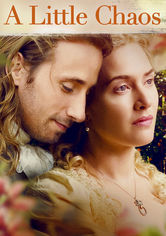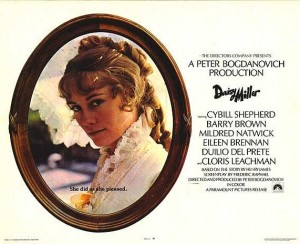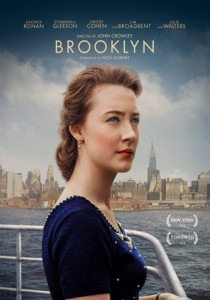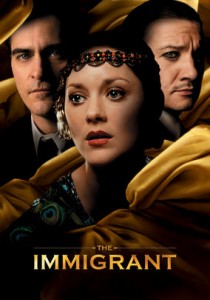A Little Chaos-2014
Director Alan Rickman
Starring Kate Winslet, Matthias Schoenaerts
Scott’s Review #269

Reviewed August 22, 2015
Grade: B-
A Little Chaos (2014) is a difficult film to review. The film does not kick into high gear, or much of gear until the final thirty minutes or so as the drama hits a crescendo and past events are suddenly explained.
At this point, it becomes a very entertaining film.
Until then, it is largely a bore and slow-paced.
Starring Kate Winslet and Alan Rickman, who also directs the film, A Little Chaos is a good film with beautiful period piece costumes to marvel over, and feels great, but misses the mark with a lack of balancing the momentum throughout the length of the film.
It is also largely fictionalized, making the viewing less enjoyable.
A period drama set at the gorgeous Versailles in France, the period in the late 1600s when King Louis XIV of France is in power and lives on the illustrious estate.
Landscaper, Andre Le Notre, hires unconventional gardener Sabine (Winslet) to create one of the gardens.
Sabine is progressive and does not live in the past. Rather, she has ideas for creating a unique pattern. Sabine is instructed to incorporate a wonderful fountain within the garden. She faces hostility from staff members for simply being a woman and they refuse to work for her.
Others admire her creativity.
As the plot unfolds, Sabine has romantic feelings for Andre, a man trapped in a loveless marriage with Francoise, and they begin a tender courtship.
Sabine is haunted by the past and frequently hears cries in her dreams. The audience does not know what her past life was, only that she is widowed.
The final act of the film brings everything together nicely. We learn about Sabine’s past and her suggested dalliance with Andre comes to fruition.
After the film, I was left thinking how exceptional it was, but then remembered the majority of it had dragged.
The themes of A Little Chaos are class systems, feminism, and societal views. At first, snubbed by some for being a commoner, Sabine slowly is accepted by the royal figures, including the King himself, whom Sabrine humorously mistakes for the gardener at one point.
Ideally, it would have been lovely if a woman had been hired to create the garden.
Sadly, events do not happen this way but is someone’s fantasy.
A Little Chaos (2014) has great potential and looks beautiful- my main complaint is for most of the film nothing happens.
Also disappointing is that the film was not filmed at the historical Versailles, nor was it even shot in France. Every exterior scene was filmed in England.
This is not a deal-breaker, but some genuineness would have been nice. Another major detraction is that Sabine De Barra is not even a real-life figure, but rather is fictionalized- sort of how the past should have been but wasn’t really.
Having been a real person would have made the film more interesting. What is the investment?
From an acting standpoint, the film succeeds. Winslet, a highly talented actress, is well cast and the chemistry between her and Matthias Schoenaerts is palpable. Both actors are believable in their roles.
Stanley Tucci, typically great in whatever he appears in, plays Phillippe, a silly, slightly effeminate Duke who does more to annoy than to amuse and is a trivial character.
Throughout my viewing of the film, I kept thinking of it as the type of film that should be liked because it looks great, but something was missing.
The royal drama, sexual dalliances, and antics were fun, but I felt like the film could have been much more than it ended up being.




